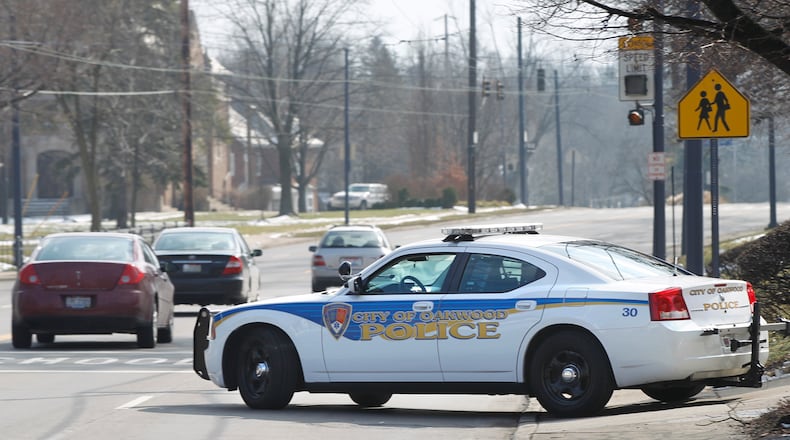City officials say they are reviewing the report but said the police department is professional and conducts traffic patrols in order to keep the community safe.
The ABLE report found in Oakwood that year black drivers accounted for 21.9 percent of the traffic stops where a problem with driving or equipment was observed, and 36.8 percent of the stops where a license plate check was run without tickets being written for an observable driving or equipment problem.
The total non-white population in Oakwood is less than 7 percent, according to the most recent data from the U.S. Census Bureau, and the black population is less than 1 percent.
“These ‘license plate check’ stops do not result from bad driving or faulty equipment but from an officer’s decision to run the plate of a passing car,” said Ellis Jacobs, senior attorney with ABLE. “In these stops, officer discretion is at its greatest. It is striking that such an outsized percentage of these tickets are given to black drivers.”
MORE: Oakwood earns lone local ‘A,’ Dayton rises to ‘D’ on state report card
A similar analysis was conducted on Kettering traffic stops.
Kettering’s population is 3.4 percent black, according to the U.S. Census, and it shares similar through-traffic, according to the report.
The ABLE report found that in Oakwood 26 percent of all people ticketed were black, and blacks received 33 percent of all tickets. (Some drivers received more than one ticket.). In Kettering, 20.1 percent of the drivers receiving traffic tickets in 2016 were black and they received 23 percent of all tickets issued that year.
On Tuesday, Jacobs and University of Dayton criminal justice professor Martha Hurley met with Oakwood City Law Director Rob Jacques and Director of Public Safety Alan Hill to provide their report and highlight what they said showed problems with how traffic stops are conducted in the city.
MORE: Your Voice Ohio: Involved citizens are key to solving the region’s problems
The Dayton Daily News conducted a study of traffic stops in Oakwood in 2001 which found that 18.4 percent of drivers who got tickets in Oakwood were black while less than .5 percent of the residents of Oakwood were African-American. In response to the articles and community pressure, the City of Oakwood agreed to collect more comprehensive data on stops.
“In Oakwood, the numbers are worse now than in the 2001 report and that’s concerning,” Jacobs said. “We saw these numbers and felt it was time to take action.”
Jacobs and Hurley wrote they were able to determine that blacks received more tickets, but comparison with total population is not sufficient “since the demographics of people using the roads that run through Oakwood are likely different from the demographics of Oakwood itself.”
MORE: New podcast takes listeners on the path of the Memorial Day tornadoes
There are two primary ways a traffic stop is initiated in Oakwood. Oakwood police give traffic tickets when they see drivers committing traffic offenses or driving vehicles with obvious equipment problems, according to the report.
They also have the discretion to run computer database checks on the license plates of cars as they drive by to check for license suspensions and other infractions reflected in those data bases.
“We compared the race of the drivers who received only status-suspension tickets - likely to have resulted from an officer running the license plate without observing a violation - to the race of the drivers who received moving violations and equipment violations, with or without status violations,” Jacobs explained.
MORE: Oakwood earns lone local 'A,' Dayton rises to 'D' on state report card
“This is something that has to be addressed immediately and in the short-term there at least needs to be some implicit bias training,” Jacobs said. “We suggested that they commission a study on the data and come up with a training plan. We do believe that any study they do will support our findings.”
The city is currently reviewing the report to determine whether it contains any useful or actionable information according to City Manager Norbert Klopsch. He said city officials will address the issue at a public meeting Monday evening.
“(ABLE) told us long ago that they were looking at traffic statistics from several jurisdictions around the area, but never gave us any indication that they were compiling data to complete a summary report solely focused on Oakwood,” Klopsch said. “Our Oakwood Public Safety Department has placed strong emphasis on traffic enforcement for decades. We have a very low crime rate in Oakwood, which is due in no small part to the fact that we regularly dedicate officers to traffic enforcement duties.”
Klopsch said that citizens, businesses and visitors enjoy a very safe community.
“We have a highly trained and professional safety department,” he said. “In my nearly 18 years as city manager, I struggle to recall a single instance when a person, of any race, contacted me to express concern about any matter relating to a traffic stop or other traffic enforcement incident.”
MORE: Oakwood reaches 3-year deals with public safety employees
About the Author
